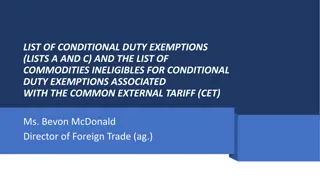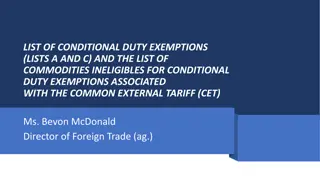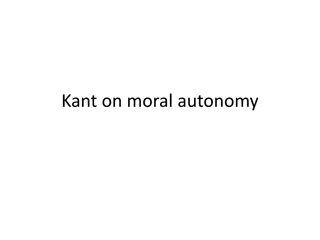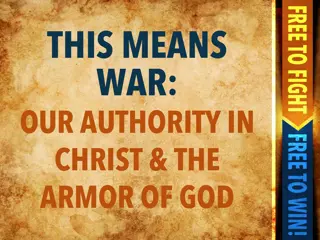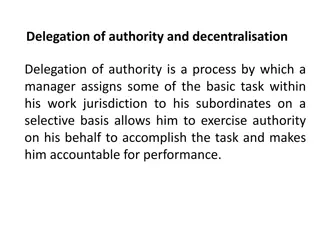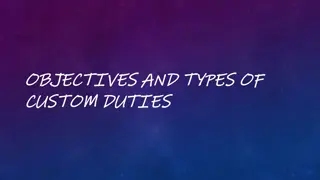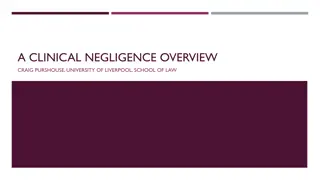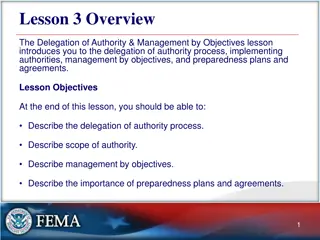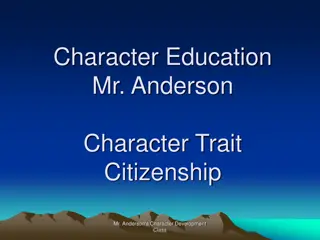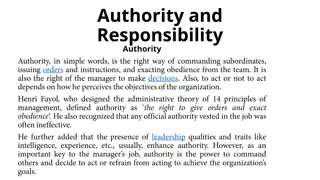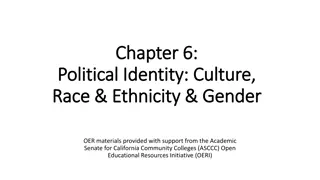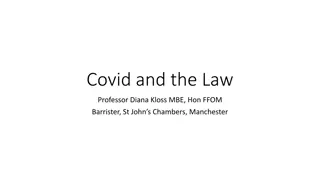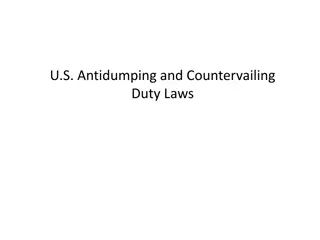Exploring Political Authority: Right to Coerce and Duty to Obey
This presentation delves into the concepts of political authority, legitimacy, and obligation, examining the right to rule and the duty of citizens to obey their government. It contrasts vigilante scenarios to government actions, discusses social contract theories, differentiating explicit and implicit consent, and debates the validity of the implicit social contract. The conditions for valid agreements and the challenges of opting out are also considered.
Download Presentation

Please find below an Image/Link to download the presentation.
The content on the website is provided AS IS for your information and personal use only. It may not be sold, licensed, or shared on other websites without obtaining consent from the author. Download presentation by click this link. If you encounter any issues during the download, it is possible that the publisher has removed the file from their server.
E N D
Presentation Transcript
1 Problem of Political Authority: An Examination of the Right to Coerce and the Duty to Obey by Michael Huemer
2 Political parable - vigilante scenario They probably won t feel a duty to pay They will likely consider your actions outrageous and naked extortion. On the face of it, your activities are of the same kind as those of a government.
3 Political authority = right to rule + duty to obey Political legitimacy: the right to rule. Political obligation: the obligation on the part of citizens to obey their government Does not mean merely that one must do things the government commands ( don t murder people ) but because the government said so Actions vs agents - we can add procedural niceties to our vigilante example. It is the who which matters
4 Traditional Social Contract Theory Most common account for last 400 years Political obligation is a species of contractual obligation: citizens must obey the law because they have agreed to do so. Explicit social contract theory - Locke
5 Implicit social contract theory - indicated by conduct passive consent - board meeting chairman asks any objections? consent by acceptance of benefits - restaurant scenario, ordering a meal by presence - party scenario, anyone who wants to stay must agree to help clean up through participation - lottery
6 Conditions for valid agreements Valid consent requires a reasonable way of opting out. Explicit dissent trumps alleged implicit consent. An action can be taken as indicating agreement to some scheme, only if one can be assumed to believe that, if one did not take that action, the scheme would not be imposed upon one. Contractual obligation is mutual and conditional.
7 Is the implicit social contract valid? Difficulty of opting out The failure to recognize explicit dissent Unconditional imposition - rules out nearly all of the ways in which citizens are said to implicitly accept the social contract. The absence of mutual obligation, e.g. failure to protect against crime
8 Hypothetical Contract Theory Why would hypothetical consent be compelling? Unconscious patient scenario. Two conditions: obtaining actual consent impossible or infeasible hypo consent must be consistent with their actual values Hypothetical consent as evidence of reasonableness - John Rawls A Theory of Justice (1971)
9 Reasonable? Rawls veil of ignorance. Could agreement be reached? Is hypo consent valid? How does it establish political authority? Employer scenario: Wonderful and reasonable offer Shipwrecked stranded on an island with limited game.
10 Validity of Hypothetical Consent Appeal to fair outcomes. Counterex: Car buying scenario. There is no compelling reason to think that the only true moral principles are those that are derived from the hypothetical contract. procedural acceptability vs substantive correctness
11 The Authority of Democracy Na ve majoritarianism - the Bar Tab scenario Deliberative democracy and legitimacy - can procedure make something right? Argument from Equality Literal equality is impossibly demanding. respecting others judgements vs disobeying unjust laws Maybe you are, in fact, better than most other people at moral reasoning, or understanding something. Bar tab. Who is being disrespectful and acting above others, students or prof?
12 Consequentialism and Fairness Benefits of government - police, law, military defense Huemer grants the assumption of benefits in this chapter. Duty to do good (implies you should recognize pol auth) But this duty need not be absolute or unqualified. Child in shallow pond scenario and variations. Alone or many, dangerous or not, etc. Arg goes: General obedience to the law is necessary for the state to function. But one person disobeying does not significantly affect that.
13 Consequentialism and Fairness cont d Rule consequentialism arg: What if everyone broke the law? But the if everyone heuristic is often wrong. What if everyone became a philosopher? Fairness of political obligation. I.e. Disobedience is unfair to other members of society. (It is not unfair to become a philosopher.) Leaking lifeboat scenario. It seems unfair to let others do all the bailing work. This does not imply fealty or obligation to obey If obedience to laws is to achieve the benefits above, then any law that does not contribute to benefits may be disobeyed.
14 Modified leaking lifeboat scenario, more like actual. All passengers shall start bailing water out of the boat; they shall pray to Poseidon to ask for his mercy; they shall flagellate themselves with belts to prove their seriousness; and they shall each pay $50 to Sally, who helped Bob get elected.
15 Consequentialism and Fairness misc. Fair Play doctrine does not obligate dissenters, people who sincerely oppose. Normally wrong to threaten or coerce others to force compliance Perhaps: If harm is bad enough, you may coerce. (Force people to bail. Steal a car to get someone to the hospital.) Even here, this entitlement is neither comprehensive nor content-independent. 6 of 9 types of govt activity seem not to be justified on consequentialist grounds. Consequentialism does not seem to support State supremacy or monopoly privilege.
16 Psychology of Authority Argumentum ad populum - Hume, Klosko argued this way! Milgram experiments. Stanford prison experiment. Dangers of obedience - disposition to obey is strong. Cognitive dissonance - oppression made people *more* positive about authority! Status quo bias and social proof. Line comparison experiment. Power of political aesthetics. Symbols, rituals, authoritative language. Stockholm Syndrome and charisma of power. Case studies like My Lai.
17 What if there is no authority? philosophical anarchism vs political anarchism policy implications Taxation- govt finance - alts: user fees, discriminatory pricing for poor, competing services Aid to the poor No authority - implications for agents, citizens. Foundations of libertarianism A nonaggression principle in interpersonal ethics. A recognition of the coercive nature of government. A skepticism of political authority.
18 Evaluating Social Theories Rational evaluation comparative and comprehensive varieties of government and anarchy (Nazi Germany and Somalia) beware of status quo bias Simplified conception of human nature approximately rational aware of their environment selfish but not sociopathic Utopianism and realism
19 The Logic of Predation Hobbes argument for govt Game theoretic considerations Social values affecting prevalence of violence Interstate violence Predation in a totalitarian State Predation under democracy
20 Individual security in a stateless society Non-state system - protection agencies & arbitration firms Conflicts between protectors Protection for criminals Justice for sale objection Security for the poor Quality of protection, organized crime, cartelization HOA vs government
21 From Democracy to Anarchy Outsource courts, police, and end standing armies Legislated to market-generated law Geographical spread of anarchy Importance of ideas



